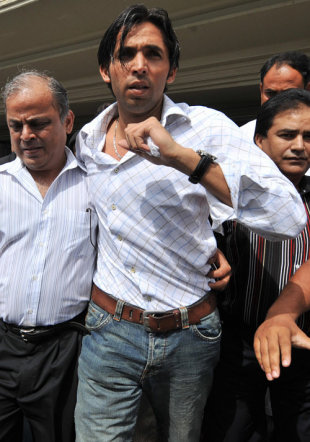The World Anti-Doping Agency (WADA) will have no jurisdiction over Mohammad Asif's detention case in Dubai, in which the fast bowler was detained at the airport
last June after being caught in possession of opium.
The PCB has received a letter from WADA about the case and though opium is on the list of banned substances - because it contains morphine - the board feels an internal inquiry is the way ahead.
"It [opium] is a drug because it contains morphine," Salim Altaf, the PCB's chief operating officer, said. "From that perspective it is a banned substance. However, if this drug is in the possession of an individual and it's out of competition, we have to look at that perspective as well. All angles will have to be looked at. I don't think WADA has any jurisdiction over it."
If this is the case, then the onus for any punitive action falls on the board. A three-man committee has been set up by the PCB, though no timeline has been decided for its operation.
This is the second such committee for the same incident, after the
first fell victim to the administrative mess caused by the regime change last year, which saw Nasim Ashraf and his upper management replaced by Ijaz Butt and his team.
A decision anytime soon seems unlikely as Altaf wants to ensure a fair, comprehensive investigation. "Once we read the report [from Dubai] and take a legal opinion on that, the committee will get to work," he said. "You cannot hang a man until you give him a fair hearing. We have written to Shafqat Naghmi (the former chief operating officer of the PCB), who was on the first committee, and asked him to send us a report - if there was any - on the matter."
Both WADA and the ICC have toughened up their doping policies but, as they are yet to be put into effect, they might not apply to this particular case. "WADA's new rules, if approved, that any athlete found with drug even if out of competition would be liable to punishment, will only be applicable after July 1, 2009," Altaf said.
The ICC has also asked individual boards to ensure their anti-doping policies are WADA-compliant. Altaf said a draft of the policy is to be submitted to the ICC by March 2009.
WADA and Asif have had a previous run-in,
in 2006, when Asif first tested positive for nandrolone, the banned anabolic steroid. Asif and Shoaib Akhtar tested positive before the Champions Trophy, during an internal testing conducted by the PCB, and after being banned initially, the punishments were scrapped on appeal.
The overturn prompted WADA to step in and challenge the decision. But the Court of Arbitration for Sports in Lausanne, Switzerland,
ruled even then that WADA had no jurisdiction over an internal matter.
Asif is currently in India, where he will remain until an IPL hearing into testing positive for nandrolone last year takes place on January 24 in Mumbai.

